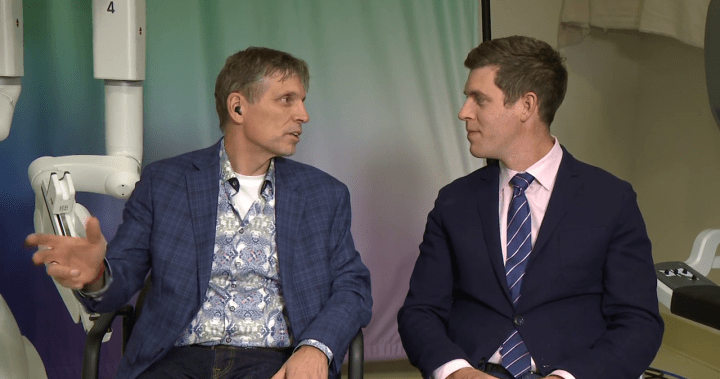Trent Murdoch was preparing to celebrate milestone family birthdays in October 2023 when he received a devastating phone call from his doctor.
“I just noted the two highlights of what he told me,” he said.
“You have been diagnosed with a very rare form of cancer called ring cell carcinoma.”
Murdoch said cancer survival rates were low and he relied on his military training to compartmentalize, move forward and prepare for surgery.
“The process of the surgery was different than any of my other surgeries, but the care provided by the nurses, anesthesiologists and medical staff supporting Dr. (Michael) Metcalf that day was exceptional ” Murdoch said.
“So there was no stress on my part. I enter relaxed. The best I can do is just give them my usual sense of humor and let’s go.
Dr. Michael Metcalfe, MD FRCSC, urologic oncology, who performed the surgery, said Murdoch’s case was very rare.
“Only 300 published cases have been documented in the history of literature,” he said.
“Any time you have a rare procedure, it requires a lot of discussion between different subspecialties to determine the best way to proceed. In (Murdoch’s) case, we had a multidisciplinary conference with medical oncologists, pathologists, radiation oncologists and radiologists, and we all brainstormed together. And that being said, after that meeting, we each individually reached out to other resources and other experts in the field, and it was widely felt that chemotherapy was not going to be of much benefit. We therefore proceeded directly to the surgical resection.

Metcalfe said the procedure is fairly standard in his field, as it is not uncommon to remove the bladder and make a new one.
“You take the small intestine, you take out 60 cm (of small intestine) and you basically fold it a little bit like a baseball. And you place it where the bladder was and you have a little section connected to the ureters and the rest of your tract.

Receive weekly health news
Receive the latest medical news and health information every Sunday.
Metcalfe said that only about 30 percent of bladder cancers require removal of the bladder and that many patients are not strong enough to survive the operation.
Although the surgery went well, Murdoch said at one point a stent connected to his ureter became loose and he began to decline. He then had to undergo further surgeries due to the leak.
Although Murdoch’s test results showed no signs of illness, he said he knew he was on a timeline.
“The goal is to beat that deadline,” he said. “I have two amazing daughters and a lovely wife – girls who are in the early stages of adulthood, so mentoring them and supporting them to the next stage of their lives is a key motivator for me and my wife.”

Metcalfe said the robotic surgical machines, purchased by the Victoria Hospital Foundation, made a difference to the success of the surgery and to Murdoch’s recovery.
One of the machines, the Da Vinci surgical robot, is robot-assisted, meaning a surgeon always has control of it, Metcalfe said.
“The goal is for this to be involved in major urological surgeries, whether it’s prostate cancer or bladder cancer, for bladder removal like the one (Murdoch) had, or for the removal of smaller kidney tumors and removing only part of the kidney tumor and sparing the rest of the kidney.
Metcalfe said he and Murdoch had now become friends.
“Through his 40 different procedures and seven different operations and six months basically in the hospital, a bond is formed and there are definitely some very personal moments between us,” he said.
“While things looked bleak, especially for the (Murdoch) outcome, where you didn’t know what the outcome was going to be and you just had to rely on each other to get through it. And luckily we did.
© 2024 Global News, a division of Corus Entertainment Inc.





